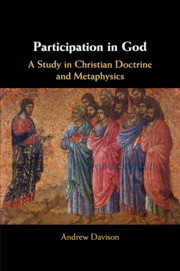Book contents
- Participation in God
- Participation in God
- Copyright page
- Dedication
- Epigraph
- Contents
- Acknowledgements
- Works of Thomas Aquinas: Texts, Translations, and Abbreviations
- Introduction
- I Participation and Causation
- II The Language of Participation and Language as Participation
- III Participation and the Theological Story
- 8 Participation and Christology
- 9 Participation and Creaturely Action
- 10 Evil as the Failure of Participation
- 11 Redemption I
- 12 Redemption II
- IV Participation and the Shape of Human Life
- Conclusion
- Bibliography
- Index of Names
- Subject Index
- Index of Biblical References
- Index of Works of Aquinas
12 - Redemption II
Justification, Merit, and Transformation
from III - Participation and the Theological Story
Published online by Cambridge University Press: 15 August 2019
- Participation in God
- Participation in God
- Copyright page
- Dedication
- Epigraph
- Contents
- Acknowledgements
- Works of Thomas Aquinas: Texts, Translations, and Abbreviations
- Introduction
- I Participation and Causation
- II The Language of Participation and Language as Participation
- III Participation and the Theological Story
- 8 Participation and Christology
- 9 Participation and Creaturely Action
- 10 Evil as the Failure of Participation
- 11 Redemption I
- 12 Redemption II
- IV Participation and the Shape of Human Life
- Conclusion
- Bibliography
- Index of Names
- Subject Index
- Index of Biblical References
- Index of Works of Aquinas
Summary
This second chapter on redemption, salvation, or union with God looks at the consequences for the redeemed creature, principally in terms of justification, sanctification, and merit. Alongside consideration of patristic and mediaeval sources, it considers Reformation perspectives on these questions. We look at Aquinas on the effectiveness of grace, and at how notions of participation can help us to navigate themes in the doctrine of redemption. These include awareness of the dangers inherent in paradigms that compare creatures directly with God, and attention to how the formal or exemplary note explored in Chapter 4 aligns with recent scholarship on the meaning of 'the righteousness of God' as what justifies sinners in the thought of Paul. The chapter closes by thinking more broadly about how approaches to participation align and link up across what has hitherto often been siloed between 'creation' and 'redemption'.
Keywords
- Type
- Chapter
- Information
- Participation in GodA Study in Christian Doctrine and Metaphysics, pp. 280 - 300Publisher: Cambridge University PressPrint publication year: 2019

